- Home
- Brand, Max
Silvertip's Strike Page 5
Silvertip's Strike Read online
Page 5
“What have you got, then?”
“Only an idea.”
“Let’s have it, Silver. Nobody accuses you of being a fathead. Fire away with the idea,” urged Rutherford.
“My idea is that we all step out and let a fourth man run the place,” suggested Silver.
“What man?” snapped Rutherford and Delgas in one voice.
“Any man we can all agree on,” said Silver.
“Name one,” said Rutherford.
“I haven’t any names on the tip of my tongue,” said Silver. “How about you?”
“It’s all a funny business,” said Delgas. “I dunno. I got no ideas. I only got a hunch that maybe Wycombe was right and a lot of trouble is likely to grow out of this here deal. Dead men don’t enjoy the money they spend.”
There was such truth in this remark that a short silence followed.
“How’s the place running now?” demanded Rutherford.
“Pretty well, I suppose,” said Silver. “The foreman knows his business. If he could suit a hound like Wycombe, he ought to suit us.”
“There is something in that,” agreed Delgas instantly.
“Make him the manager?” asked Rutherford.
“You fellows think that I’m sure to be against you, and that I’m sure to try to put one over on you,” said Silver. “Get that idea out of your head. If you don’t want Farrel, take anybody you like — if I like him, too.”
Delgas and Rutherford looked fixedly at one another.
“Well, that sounds all right to me,” said Delgas.
Rutherford shrugged his narrow shoulders. He sat down, made a cigarette with the fingers of a conjurer, and lighted it. He spoke, breathing out the smoke through nose and mouth.
“Make it Farrel till we vote him out,” suggested Rutherford. “A majority vote puts one ranch manager out and a new one in. This is a democratic country, and the majority ought to rule.”
“You’ve got your voters all in a lump,” answered Silver. “No. One vote has to be enough to put out the manager. And a new one can’t go in until every one of the three of us is satisfied.”
There was another silence.
“Well,” said Rutherford, “that might mean never. We might never hit on the kind of a fellow who would please all of us. I’m for putting this whole ranch on sale and getting rid of it.”
“You couldn’t get a quarter of what it’s worth,” complained Delgas. “I asked a couple of bankers what this here place is worth. The money they talked made me sick, I can tell you! They don’t want to pay nothing. Nothing at all! There ain’t any market for desert land, like this. People are afraid of a big drought when even the well might go dry, and then the cows would starve before they could be drove to the nearest water hole. And all we could do would be to sell the cattle and call it quits. And I ain’t ready to be robbed like that!”
“Nor I!” said Rutherford. He turned to Silver, saying: “We’ll start out with Farrel, then. Your man Farrel will make a start. If any of us don’t like him, he’s fired on the spot. That suit you?”
“That has to suit,” answered Jim Silver.
He stood up.
“You boys,” he said, “have been talking about building a shack up in the foothills. You don’t have to. You can stay right here and live in the house. It belongs to me, but you’re mighty welcome to room in it.”
He walked out of the room and into the kitchen, where he saw the girl. She had had sleepless nights since the death of Wycombe, and now there were black shadows inlaid around her eyes.
“It’s all right,” said Silver. “Farrel stays on. He’s not the foreman, but the manager.”
He went out to the place where Farrel was nailing some new shakes on the roof of the big shed. At the signal he gave, Farrel came quickly down to the ground.
“You’re to stay on as manager,” said Silver.
“Thanks,” said Farrel. “I know you did that for me, Jim. It’s not the first good thing you’ve done for me, though. Are things going to be all right?”
“All right?” echoed Silver, laughing a little. “Why, man, one of these days there’s going to be an explosion big enough to blow up everything.”
“Then why do you stay?” asked Farrel, agape. “Two of ’em to one of you. I’d be on your side, but I’m no gunman. Why do you stay, Jim?”
“Because,” said Silver, “I don’t know when the explosion will come, and I like to hear the fuse burn.”
CHAPTER VIII
TROUBLE’S SIGN
Since Jim Silver looked for a storm, he was by no means deceived by the perfect peace and quiet of the first few days that followed, when big Morris Delgas and Harry Rutherford were both the perfection of consideration, as far as they knew how to be.
For one thing, they seemed to be taking very seriously their new-found duties as ranchers, for they were hardly ever at the ranch house, except for meals. The lunch hour they often missed completely when they went off on a whole day of exploration — “a day’s hunt,” as Morrie Delgas used to say, “to find mountain lions, mountain sheep, or mountain suckers.”
Morrie Delgas was very gay. His loud voice boomed through the house. His heavy step thundered on the floor. Rutherford, beside him, was like a cat beside a horse, speaking little, keeping himself neat always, with a pale smile on his pale face. But, by the shifting lights in his eyes, it was plain that his mind was never still.
There was only one sign of trouble, a few days after Delgas and Rutherford came to live at the house. At the breakfast table, after Delgas had had his “eye opener” of rye, he boomed out to Silver:
“You’ve got the ready cash, Silver. You’ve got heaps of it, and we’re just about broke. How about a couple of thousand on account?”
Silver looked across the table and permitted his smile to broaden a trifle.
“You mean a couple of hundred, Morrie, don’t you?” he asked.
Delgas stared back, not at Silver but at Rutherford.
“He says that I mean a couple of hundred, not grands,” quoted Delgas.
Rutherford nodded. Nothing further was said, no gesture made to accept the money. Delgas seemed to be hearing what he expected, and Silver knew by a thrill in his bones that trouble had been brought still closer to him.
Two days later, Farrel reported quietly to Silver that he was beginning to have trouble with the men.
“They look me in the eye and swallow their grins,” said Farrel. “I feel their eyes following me, too, and their grins when my back is turned.”
“What’s wrong?” asked Silver.
“You know,” said Farrel, “one bad apple will spoil a barrel. And this gang was always a tough lot to handle. Wycombe wanted them that way. He never employed a man that hadn’t done time.”
“You mean all the lads on the place have a prison record of some sort?” asked Silver.
“That’s what I mean,” answered Farrel. “Wycombe always felt that he might get into a pinch where he’d want tough fellows around him, to back him up. So he collected this crew. Only, when he heard that both Delgas and Rutherford were on the trail after him, he lost his nerve and sent for you. He needed a bigger gun than any he’d ever hired, so he got hold of you. But there’s not a man on the place that isn’t pretty good with guns, in one way or another. Wycombe knew I hadn’t been in jail, and that suited him because he wanted an honest foreman to handle accounts.”
“How have you managed to handle this gang?” asked Silver curiously.
“I’m a little better with my hands than they are,” said Farrel. “Besides, I know one end of a gun from another. They don’t want trouble with me unless it’s worth their while; but, if it is worth their while, any one of the lot would be glad enough to rip into me, I suppose.”
“What bad apples were dropped into the barrel?” asked Silver.
“You guess,” answered the foreman.
“You mean Delgas and Rutherford?”
“They’re not too busy riding the range fo
r the sake of hunting,” said Farrel. “They never bring any game in. And they don’t need all of this time to look over the lay of the land on the ranch. But I’ve spotted one of them time and again, off on the sky line, talking to one of the punchers and then fading out of the picture. They got up into the foothills, too. I don’t know for what.”
“Any guesses?” asked Silver.
“Yes. But nothing I can back on.”
“Fire away.”
“I think that they’re in touch with crooks who’ll buy a lot of cattle if they can get ’em at the right price. The other day I bumped into Sam Waring riding across our range. You know Sam?”
“No,” said Silver.
He leaned back in his chair and let the sun flow over his body while his eyes were closed.
Farrel regarded the placid calm of his “one-third” boss with a troubled eye. He stepped closer as he added:
“Sam Waring is a tough hombre. He’s as tough as they come. He’s done plenty of time, and he’s been up for counterfeiting. You know that they’re tough when they handle the green goods.”
“That’s Federal business. Yes, they’re tough or crazy when they handle the green goods,” agreed Silver, opening his eyes drowsily.
“Waring,” said Farrel, “isn’t up here for his health. He’s in on some deal or he wouldn’t be around. He told me that he was just passing through on a line for the other side of the Farrel Mountains. But I think he was lying. He’d make a good running mate for Delgas and that ghoul of a Rutherford. If he’s that close to them, it’ll be strange if they don’t get together.”
“You don’t like Rutherford?” said Silver.
“Do you?” asked Farrel.
“He’s a handsome fellow,” said Silver. “Go on and think out loud, Danny.” Farrel hesitated.
Then he exploded: “In two days the punchers on this place could sweep every sound head of cattle right off up the valleys in the foothills and turn ’em over to anybody with the cash to pay half value on the nail! And Waring always represents plenty of money. My hunch is that he’s been sent for to take the cows — at a price.”
“Why does this burn you all up?” asked Silver lazily.
“Why?” cried Farrel. “Because I’ve put in my years building the herd. When I came here, there was a scratch lot of worthless beef too weak to cover ground for fodder and get back to water again. I’ve traded and bred and fought and prayed to make this herd what it is. I came onto the job when I was a kid. I’m not very old now, but, believe me, I’ve done a lifetime’s work already, I think.
“This herd is what it ought to be — long and rangy, with enough bone to carry flesh when the cattle go north to fatten on good grasslands. It’s my work. It’s the sort of a herd that used to run on the place when my father had the ground. You can’t build the right sort of a herd in a minute. It takes years. Once it’s wiped out, you have to go clear back to the start, and that’s hard. Maybe you’ll never hit just the right combination again. And now a pair of crooks are likely to wipe out all the work that I’ve done. That’s why I’m burning up! That’s why I want to know what you intend to do about it.”
“Nothing,” said Silver.
“Nothing?” cried Farrel.
“Not a thing — yet,” said Silver.
“Then you’re not worth the powder it would take to blow you up!” shouted Farrel.
Silver closed his half-opened eyes again.
Farrel’s footsteps strode to the door and halted there.
“I’ve said too much,” he growled. “You saved my hide, the other night. I forgot that for a minute. I remember it now. Silver, does it make any difference if I say I’m sorry?”
“Sure. It’s all right,” said Silver. “Don’t worry about me. Just tell me why Delgas and Rutherford should want to sell all the stock off at about half price, will you?”
He kept his eyes closed, but he could feel young Farrel coming back toward him. The voice of the foreman grew louder, more vibrant again.
“Because,” said Farrel, “if your share is thrown in with theirs and sold, they won’t be losing so very much. Because fellows like that always prefer hard cash to anything else in the world. Finally, because, once the cattle are gone, they’ll soon have you off the ranch — and they hate your heart. I’ve seen them looking at you when your back was turned. They hate your heart.”
Silver, without opening his eyes, took a sack of tobacco out of a breast pocket, together with a little battered pack of wheat-straw papers. Deftly and blindly he made his cigarette, a trick very worthwhile to one who often must ride at night. He crimped one end of his smoke, put the other between his lips, took out a cube of sulphur matches, and scratched one of them under the arm of his chair.
He allowed that match to burn for an instant so that the sulphur fumes would clear away. Then he lighted his cigarette and threw the match into the air. The flame fluttered out. The match left in the air a little irregular-curving streak of blue smoke. And still the eyes of Silver were not open as he smoked.
Farrel, biting his lips, took heed of all of these details.
“They want me out of the way?” said Silver. “How does having the cattle wangle that for them?”
“Don’t you see?” argued the other. “That’s your hold on them in this bargain about the leaving of the ranch?”
“I’ve got the house and the water rights.”
“The house doesn’t matter. And the water rights don’t matter if there aren’t any cattle to need the water. You’ll be stuck here with nothing on your hands except the hard cash that you pulled down in the deal. You’ll have ho land; you’ll have no cows; you’ll have to clear out; and then they will manage to sell off the land. They’ll pull the wool over the eyes of some fool of a tenderfoot buyer and make him think that he gets the water rights with the land. Isn’t that clear?”
Silver whistled.
“I hadn’t thought of all that,” said he.
“And now,” urged Farrel, “tell me what you’re to do about it, will you?”
“I’m going to think,” said Silver, and continued to smoke with closed eyes.
Farrel endured the picture of indifference as long as he could. Then he turned without a word and strode out of the room.
• • •
Silver continued to lead the life of an idler, rarely leaving the house. He was in bed early. He was up very late. As he sat alone at his breakfast, he could sometimes feel the eye of the girl fixed upon him with a melancholy appeal, but neither she nor Farrel spoke a word to him about the subject of Farrel’s anxiety.
It was two days after this that the next step was made toward tragedy. Farrel came into the house in the middle of the day.
Through the window of his room, where he lounged in the easy-chair, Silver saw the foreman come from the corral with bowed head. In the kitchen, Farrel paused for a moment, and Silver heard the girl cry out sharply with pain.
By that, Silver knew what had happened. He knew still better when Farrel stood before him in the room, looking years older, wrinkled about the eyes, drawn, battered of face like one who has faced a great storm for many hours.
“Delgas and Rutherford have fired me,” said Farrel. “They sent me to you for my pay.”
CHAPTER IX
NINE AGAINST TWO
From the expression in the face of Silver, it seemed that he was hearing of a thing with which he had been long familiar.
He took out a wallet.
“What’s owing?” he asked.
“I’ve had fifty from them. You owe me twenty-five.”
Silver passed out the amount and replaced his wallet in his pocket. Farrel went back to the door and made a farewell speech.
“I thought it might be that we could make a fight to save the herd,” he declared. “I thought you might be the one man in the world to beat those crooks. But I guess you’re too tired. I’m thanking you for the life that I still walk around with — and — so long, Silver.”
He wa
s half through the doorway when Silver, his hands folded beneath his head, his eyes lazy, turned a little in the chair and asked:
“Where you going, Danny?”
“Going?” answered Danny. “I don’t know. I don’t care. Just somewhere.”
“Why not stay here?”
“Here? I’m fired, I tell you. I’ve been paid off.”
“You’ve been paid off by the ranch. Now I hire you again at the same rate of pay,” said Silver.
At this, Farrel gripped the edge of the door so that the knob of it jangled suddenly. Then he made a quick step back inside the room. He pulled the door shut as carefully as though death were in the making of a sound, and there he stood before Silver, staring with incredulous eyes.
“Sit down and rest your feet,” said Silver.
“Tell me what’s in the air?” asked Farrel.
“I’m retaining a good man because I might need him. You’ve got a room in the house. Go upstairs and use it.”
“How?”
“Go up and lie down and rest.”
“Rest? I don’t need to rest.”
“Do what I tell you,” said Silver quietly. “There may be a time ahead when you won’t rest for quite a spell. So long, Danny. Go take it easy while you can.”
Farrel looked at him with blazing eyes. “I might have known,” he said, with a trembling voice. “I might have known that you wouldn’t lie down and take it — like a dog! I don’t care what pops. I’m with you to the finish.” He went out of the room. The keen ear of Silver, afterward, heard the excited babbling of voices in the kitchen, and he smiled.
Delgas and Rutherford came in before supper time, and Delgas said carelessly: “That bum of a Dan Farrel, I gave him the rush to-day. He’s no good.”
“He’s a tramp,” said Rutherford.
Silver, reclined in his chair, looked over the two of them casually. The face of Rutherford, which generally was the color of a cellar-grown plant, was now patched with sunburn, and his lips were gray from the chapping wind raised by a galloping horse. Dust had reddened the eyes of both men. Delgas had fortified his greasy skin by letting a week’s beard darken his face. They sat down uninvited in the room of Silver and lighted cigars.

 Alcatraz
Alcatraz the Long, Long Trail (1923)
the Long, Long Trail (1923)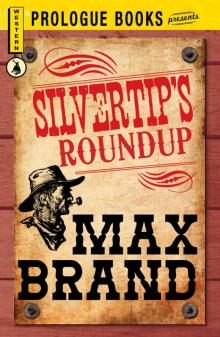 Silvertip's Roundup
Silvertip's Roundup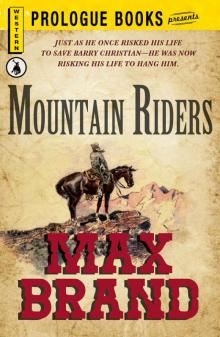 Mountain Riders
Mountain Riders Silvertip (1942)
Silvertip (1942)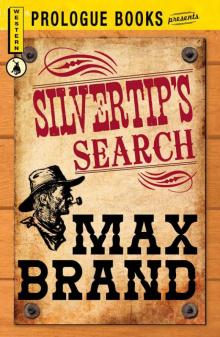 Silvertip's Search
Silvertip's Search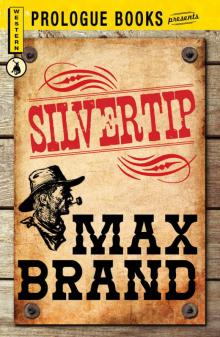 Silvertip
Silvertip Bull Hunter
Bull Hunter Gunmans Reckoning
Gunmans Reckoning The Seventh Man
The Seventh Man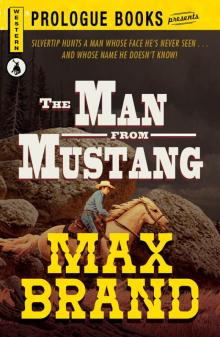 Man From Mustang
Man From Mustang Riders of the Silences
Riders of the Silences Black Jack (1922)
Black Jack (1922) Way of the Lawless
Way of the Lawless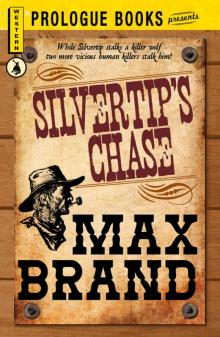 Silvertip's Chase
Silvertip's Chase Trailin
Trailin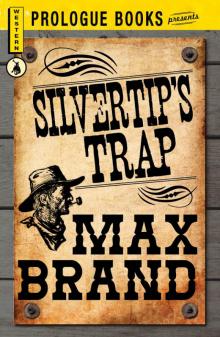 Silvertip's Trap
Silvertip's Trap Ronicky Doone (1921)
Ronicky Doone (1921) The Night Horseman
The Night Horseman the Garden Of Eden (1963)
the Garden Of Eden (1963)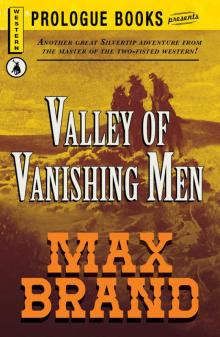 Valley of the Vanishing Men
Valley of the Vanishing Men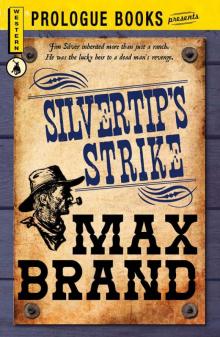 Silvertip's Strike
Silvertip's Strike Black Jack
Black Jack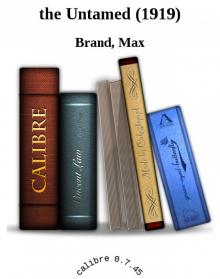 the Untamed (1919)
the Untamed (1919) Way Of the Lawless (1921)
Way Of the Lawless (1921) The Untamed
The Untamed